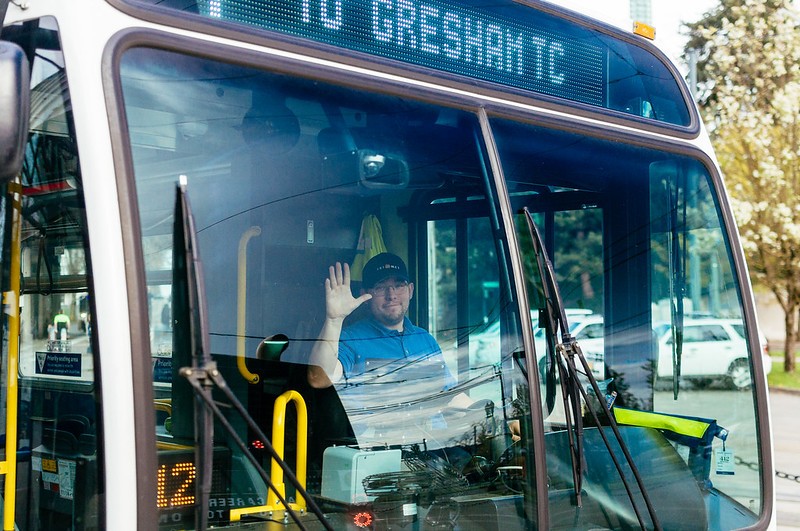TriMet’s historic driver shortage has stabilized, with a spokesperson saying the agency has the number of drivers it needs to maintain its current service level even as ongoing staffing issues have required it to alter its rollout of proposed service expansions in the coming years.
“They are improving,” said Fred Casey, Vice President of Amalgamated Transit Union 757 (ATU), TriMet’s operator union. “Beforehand [TriMet] was only getting one to maybe five people per training class, but now moving into this year, starting in mid-November, I think, their class sizes started to increase.”
For riders and operators alike, it’s a welcome change. In January 2022, TriMet reduced service on 20 of its 84 bus lines, resulting in a nine percent decline in the agency’s total bus service—a decline commensurate with cuts made in April 2020 at the beginning of the COVID-19 pandemic.
TriMet further reduced service on or cut ten more bus lines in September 2022, blaming the reduction in service on the ongoing labor shortage and announcing that the agency had no plans to restore the service cut in January.
In an email to the Mercury this week, TriMet spokesperson Tia York confirmed that the agency still has no plans to reverse the cuts in service it made last year but said that it is no longer facing a major operator shortage.
According to York, the agency now has the number of drivers it needs to maintain its current level of service. York said TriMet needs 890 full-time operators to drive its schedule and currently has 969, with several hundred more drivers working in a part-time capacity.
A significant number of those drivers were hired in the last year. TriMet hired 290 bus operators in 2022 and, of that group, 202 successfully completed the agency’s mandatory seven-week training course. York said that roughly 60 more new hires are currently going through the training program.
York chalked the renewed interest in operator positions up to starting pay increases and hiring bonuses announced more than a year ago. As of December, the starting hourly wage for new drivers is up to $27.13—a living wage in Multnomah County for an adult with no children according to the MIT Living Wage Calculator, but short of a living wage for an adult trying to support family members.
“On average, we received 60-70 applications per week in 2022 and were pleasantly surprised to see little to no dip in interest around the busy holiday season,” York wrote.
Casey said that one incentive in particular has helped TriMet’s hiring drive: a $7,500 bonus paid out over three years that the agency began offering new hires last year. That kind of money has made driving a more attractive possibility to people who are often TriMet riders themselves and have an understanding of how grueling the work can be.
“This job is tough,” Casey said. “I don’t think the public realizes how hard being a bus operator is. You are trapped. You’ve got a lot of people out there that you just don’t know how they’re going to react to everything at any given moment.”
The addition of more operators is critical in the lives of many TriMet riders who have experienced longer wait times, delays, and surprise cancellations of buses and MAX trains as a result of the operator shortage.
“If the bus is not running because there’s no driver, or if the train gets canceled… that means we have to wait around until we have to start running or figure out different ways to get to the places we're going,” Abby Griffith, an organizer with TriMet rider advocacy group Bus Riders Unite!, said. “It’s not easy for most people to go find different rides.”
The progress of the agency’s hiring efforts is also positive news for TriMet’s veteran operators, who had to shoulder the burden of the understaffing by driving long hours under challenging working conditions. Casey said that TriMet isn’t far enough into its new hiring wave for drivers to be seeing the impacts yet, but he’s cautiously optimistic about what’s happening at the agency.
Casey pointed to TriMet’s newfound willingness to rework its Service Improvement Process for logging and responding to complaints about operators as one reason why. ATU president Shirley Block wrote in a message last week that the new policy focuses on “retraining and reinstruction rather than discipline.”
“Morale is still in the tank,” Casey said. “However, when we were out talking to people at the different garages this week, talking about the new discipline policy, it was very well received. We’re hoping that will be a foothold in turn around for morale.”
That new disciplinary approach and the emphasis on training new operators is one of the ways in which Casey said that TriMet’s new leadership is slowly rebuilding trust with the union, which deteriorated under former General Manager Doug Kelsey.
Even though interest in bus driver positions has picked up over the last several months, the agency still has nowhere near enough drivers to implement the agenda it has advanced in its Forward Together plan — a proposal to significantly expand bus service throughout the metro area in alignment with changes to commuter behavior due to the pandemic.
York said that in order to fully implement the plan, TriMet would need to add 430 drivers to its Fall 2022 staffing level. Even if the interest existed, York wrote, it could take until “at least 2027” to hire and train those new drivers. The agency’s strained training capacity is emerging as a major issue as it attempts to staff back up.
“We consistently have more qualified candidates than space available,” York wrote.
Facing both hiring and training capacity challenges, TriMet has opted to break its proposed service expansion into phases that can be adopted when the agency has the appropriate staffing levels. The first phase, released as part of the agency’s 2023-2024 service plan last week, suggests upgrading five bus lines to frequent service, increasing service to every 30 minutes on several bus lines, and canceling low ridership bus routes. The complete list of proposed service changes can be found on the agency’s website.
TriMet has scheduled a number of forums starting next week for community members to learn about the proposed changes and provide their feedback. The first of those forums will take place on Tuesday in Northwest Portland. Members of the public can also submit public comments online.
Operators who will be driving the routes have provided mixed input on the service changes—but according to Casey, before the change in leadership at TriMet, there wouldn’t have even been an open conversation about them.
“Two years ago, if we had that meeting, they just would have slammed the door in our face and told us ‘We don’t care what you think,’” Casey said. “But the meeting last week was extremely productive.”
It’s one reason why Casey is cautiously optimistic that the operator shortage and toxic labor relationship that have plagued TriMet over the last several years may be abating.
“We hope that we can get back to the heyday when TriMet was the place for other agencies to come and model themselves off of,” Casey said.




















